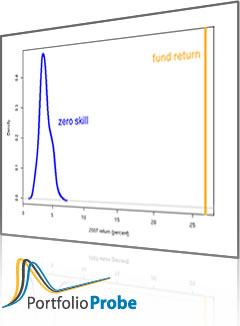Follow us using:
Newsletter Sign-up
Tag Archives: low volatility investing
On smart beta
A bit of perspective on a buzzword. The prompt The Axioma Quant Forum in London included a discussion of smart beta. I took two highlights from it: a point of view and a question. The point of view was stated by Gerben de Zwart: “Smart beta seems like a replay of simple quant strategies of the … Continue reading
The low volatility anomaly and CAPM
A look at a paper that explores possible assumption failures of CAPM that would explain the low volatility anomaly. Previously We’ve talked about CAPM before, in particular: 4 and a half myths about beta in finance There has also been substantial talk about low volatility investing. The paper The paper is “Explanations for the Volatility … Continue reading
Horses and volatility
Two items struck me as being connected. Maybe they are. The items: Payoff of betting on horses versus the odds The Missing Risk Premium by Eric Falkenstein As you can see there is a unicorn on the cover, but that is not the horse connection I had in mind. Horses The post at Thinking in … Continue reading
Low volatility investing and benchmarks
The focus on tracking error rules out a low volatility strategy. Simply put, most money managers are focused on outperforming their benchmarks without adding risk. And because risk is measured on a relative basis, a portfolio that moves up and down less than its benchmark is perceived as more risky on a relative basis because … Continue reading
Betas of the low vol cohorts
How did the constraints affect portfolio betas, and how did the betas change over time? Previously “Low (and high) volatility strategy effects” created 6 sets of random portfolios — the so-called low vol cohorts — as of 2007 and showed their performance up to about a month ago. “Rebalancing the low vol cohorts” looked at … Continue reading
Posted in Quant finance, R language, Random portfolios
Tagged beta in finance, low volatility investing
1 Comment
Low (and high) volatility strategy effects
Does minimum variance act differently from low volatility? Do either of them act like low beta? What about high volatility versus high beta? Inspiration Falkenblog had a post investigating differences in results when using different strategies for low volatility investing. Here we look not at a single portfolio of a given strategy over time, but … Continue reading
Posted in Quant finance, R language, Random portfolios
Tagged beta in finance, low volatility investing
1 Comment
What does ‘passive investing’ really mean?
We know the words but what do they mean? Some definitions Here are some definitions of “passive investment management”. Investopedia says: A style of management associated with mutual and exchange-traded funds (ETF) where a fund’s portfolio mirrors a market index. Wikipedia says: Passive management (also called passive investing) is a financial strategy in which an investor (or … Continue reading
Some papers on low volatility investing
Abnormal Returns points to The Capital Spectator piece Volatility & Portfolio Management research review. This has links to 5 relatively recent papers related to volatility. Previous posts here on this topic can be found at the low volatility investing tag. Subscribe to the Portfolio Probe blog by Email
Beta and expected returns
Some pictures to explore the reality of the theory that stocks with higher beta should have higher expected returns. Figure 2 of “The effect of beta equal 1” shows the return-beta relationship as downward sloping. That’s a sample of size 1. In this post we add six more datapoints. Data The exact same betas of … Continue reading
Posted in Quant finance, R language
Tagged beta in finance, Capital Asset Pricing Model, CAPM, low volatility investing, S&P 500
Leave a comment
An introduction to “Expected Returns” by Antti Ilmanen
The subtitle is “An Investor’s Guide to Harvesting Market Rewards”. Executive summary I don’t hold myself as being much at forecasting, but I predict that this will be a classic that many of us will go back to and consult periodically for years to come. Purpose Antti does better than I could have at describing … Continue reading
